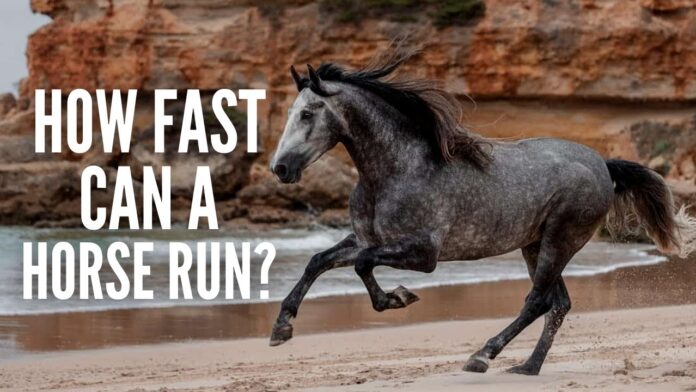Horses have fascinated humans for millennia, not only for their beauty and grace but also for their impressive speed and endurance. Whether galloping across fields or racing on tracks, the speed of a horse has been a subject of admiration and study. In this article, we will delve into the various factors that determine how fast can a horse run, examining everything from breed differences to training methods and the science behind their remarkable abilities.
The Importance of Understanding Horse Speed
Understanding the speed capabilities of horses is crucial for various reasons. For horse owners and trainers, it helps in optimizing training programs and ensuring the well-being of the horse. For sports enthusiasts, it enhances the appreciation of equestrian events. Moreover, knowledge of horse speed has historical and cultural significance, reflecting the evolution of transportation and sports.
Historical Perspective on Horse Speed
Throughout history, horses have been bred and trained for speed, serving as crucial assets in transportation, agriculture, and warfare. Ancient civilizations such as the Egyptians and Romans prized fast horses for chariot racing and cavalry. Over centuries, selective breeding practices have honed the speed capabilities of certain breeds, laying the groundwork for modern equestrian sports.
Anatomy of a Horse: Built for Speed
Skeletal Structure
The skeletal structure of a horse is specifically adapted for speed. Long limbs, light bones, and a flexible spine allow for extended strides and efficient movement.
Muscular System
A horse’s muscular system plays a critical role in its speed. Powerful muscles in the legs and back provide the force necessary for rapid acceleration and sustained galloping.
Cardiovascular and Respiratory Systems
The cardiovascular and respiratory systems of a horse are highly efficient, enabling the delivery of oxygen-rich blood to muscles during intense physical activity. This efficiency is crucial for maintaining high speeds over longer distances.
Factors Affecting Horse Speed
Breed Differences
Different horse breeds exhibit varying speed capabilities. Thoroughbreds, known for their racing prowess, can reach speeds of up to 55 mph (88.5 km/h), while Quarter Horses excel in short sprints.
Age and Training
Age and training significantly influence a horse’s speed. Young horses may not have fully developed muscles, while older horses might experience a decline in speed. Proper training enhances strength, endurance, and technique.
Diet and Nutrition
A balanced diet rich in essential nutrients supports muscle development and overall health, directly impacting a horse’s speed. High-quality feed and supplements can make a noticeable difference.
Health and Fitness
Overall health and fitness are paramount. Regular veterinary check-ups, appropriate exercise regimes, and preventive care help maintain a horse’s optimal performance levels.
Speed Records in Horse Racing
Notable Thoroughbred Records
Thoroughbreds hold many speed records. The legendary Secretariat, for example, set a record in the 1973 Belmont Stakes with a speed of 37.5 mph (60.3 km/h).
Quarter Horse Achievements
Quarter Horses are renowned for their incredible bursts of speed in short distances. The record for a Quarter Horse stands at an impressive 55 mph (88.5 km/h) over a quarter-mile race.
Other Breeds and Their Records
Other breeds, such as Arabians and Standardbreds, also showcase notable speed records, although they are often bred for endurance rather than pure speed.
Training Techniques to Enhance Speed
Interval Training
Interval training involves alternating periods of high-intensity sprints with rest or low-intensity exercises. This method improves cardiovascular fitness and muscle strength.
Hill Work
Training on hills enhances a horse’s strength and stamina. The added resistance of uphill running builds powerful leg muscles and increases overall endurance.
Consistent Conditioning
Consistent conditioning is key to maintaining a horse’s speed. Regular, varied workouts ensure that the horse remains in peak physical condition without overtraining.
Diet and Nutrition in Training
Proper nutrition supports intensive training. High-protein diets and specialized supplements aid in muscle recovery and growth, essential for maintaining high-speed performance.
The Role of Jockeys in Maximizing Speed
Jockey Techniques
Jockeys use specific techniques to maximize a horse’s speed. Proper posture, balanced weight distribution, and effective use of reins can significantly impact a horse’s performance.
Communication with the Horse
Effective communication between a jockey and horse is crucial. Understanding the horse’s cues and responding appropriately can enhance coordination and speed.
Technological Advances in Horse Racing
High-Tech Training Equipment
Modern training equipment, such as treadmills and swimming pools, provides varied and controlled environments for conditioning horses, enhancing their speed and endurance.
Performance Monitoring
Advanced monitoring tools track a horse’s heart rate, speed, and other vital metrics during training, allowing for precise adjustments to training regimens.
Biomechanics Analysis
Biomechanical analysis helps in understanding a horse’s movement patterns, identifying areas for improvement, and preventing injuries, thus optimizing overall speed.
Common Myths About Horse Speed
Myth: All Horses Can Run Equally Fast
Not all horses possess the same speed capabilities. Breed, age, health, and training all play significant roles in determining a horse’s speed.
Myth: Speed is Only About Physical Strength
While physical strength is important, factors such as cardiovascular fitness, mental state, and training quality are equally crucial in determining a horse’s speed.
Myth: Older Horses Can’t Be Fast
Although younger horses are generally faster, older horses can still achieve impressive speeds with proper care and training.
Horse Speed in Popular Culture
Iconic Racing Movies
Movies like “Seabiscuit” and “Secretariat” have immortalized the speed and spirit of racehorses, captivating audiences and highlighting the allure of horse racing.
Famous Racehorses
Famous racehorses like Secretariat, Seabiscuit, and Man o’ War have become legends, celebrated for their extraordinary speed and achievements.
The Future of Horse Speed
Genetic Research
Advances in genetic research hold the potential to further enhance the speed capabilities of horses. Selective breeding and genetic modifications may lead to faster and more resilient horses.
Innovations in Training
Continued innovations in training techniques and equipment will likely improve the conditioning and performance of racehorses, pushing the boundaries of speed even further.
Ethical Considerations
As technology and breeding techniques advance, ethical considerations regarding the welfare and treatment of horses will become increasingly important.
Frequently Asked Questions (FAQs)
What is the fastest speed ever recorded by a horse?
The fastest speed ever recorded by a horse was 55 mph (88.5 km/h) by a Quarter Horse.
How do different breeds compare in terms of speed?
Thoroughbreds are known for their long-distance speed, while Quarter Horses excel in short sprints. Other breeds like Arabians are bred more for endurance than speed.
Can a horse’s diet affect its speed?
Yes, a horse’s diet significantly affects its speed. Proper nutrition supports muscle development, energy levels, and overall health, all of which are crucial for optimal speed.
How important is a jockey in horse racing?
A jockey plays a critical role in horse racing. Their techniques, communication with the horse, and ability to optimize the horse’s performance can greatly influence the outcome of a race.
Are there any age limits for a horse’s racing career?
While younger horses typically have faster speeds, horses of various ages can compete. Proper training, health care, and conditioning can extend a horse’s racing career and maintain its speed.
Conclusion
The speed of a horse is a marvel of nature and a testament to centuries of breeding, training, and care. Whether on the racetrack or in the wild, horses continue to captivate us with their incredible speed and agility. Understanding the factors that influence horse speed can enhance our appreciation of these magnificent animals and their role in human history and culture.
Also Read: Crackstream Alternative: Legal and Safety Considerations for Online Streaming

